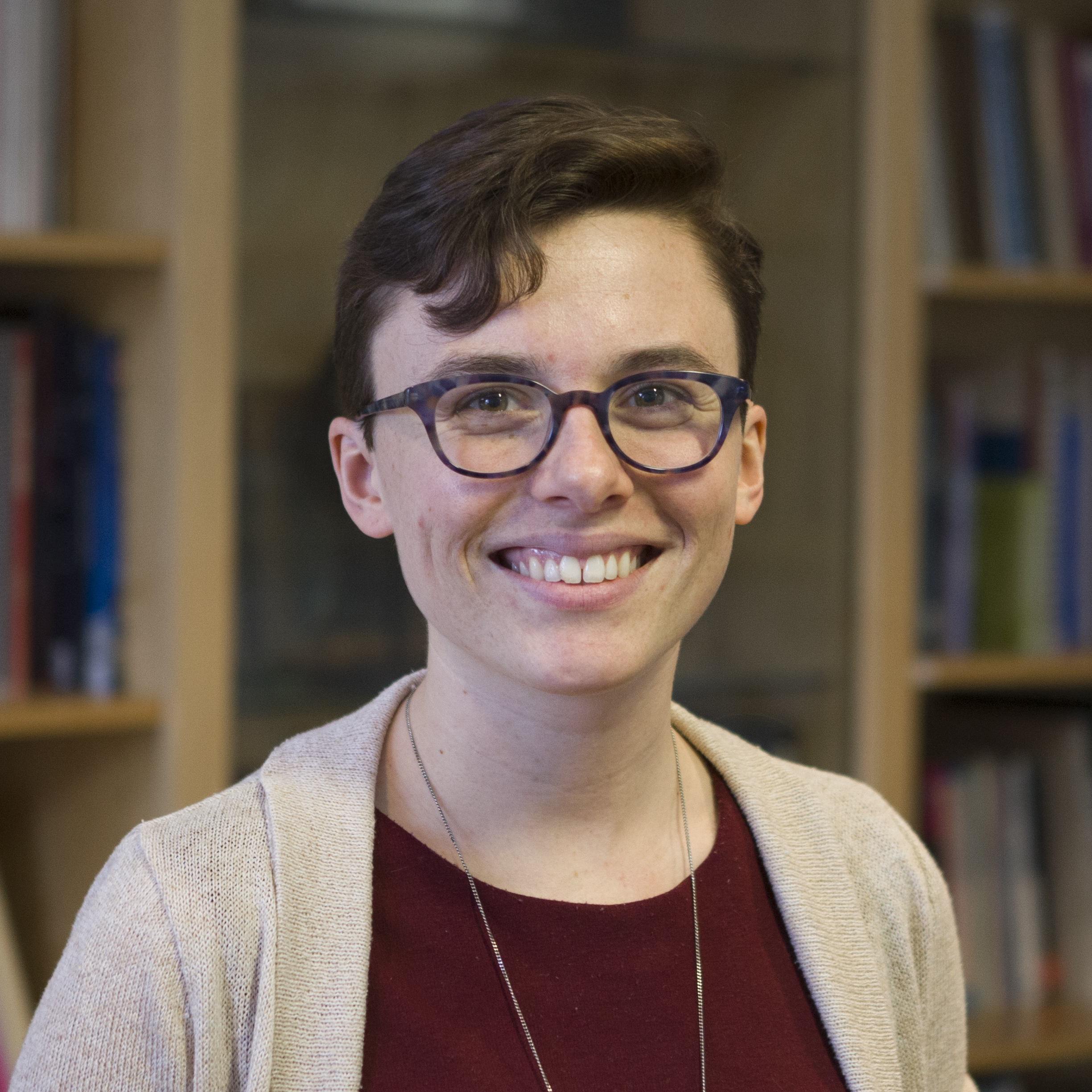The McGill Global Health Scholars program for Graduate Students supports Masters- and PhD-level McGill students engaged in global health research in low or middle-income countries (LMIC) or in Northern Canada. Learn more about our current and past participants below.
Emmanuelle Batisse
 PhD Candidate, Epidemiology – Participant in the McGill Global Health Scholars Program for Graduate Students supported by the Soe-Lin-Hecht Global Health Graduate Award
PhD Candidate, Epidemiology – Participant in the McGill Global Health Scholars Program for Graduate Students supported by the Soe-Lin-Hecht Global Health Graduate Award
Emmanuelle’s project: Exposure to Household Air Pollution and Immune Function Among Rural South African Children participating in the Venda Health Examination of Mothers, Babies and their Environment (VHEMBE).
“In South Africa, more than 40% of the rural population still uses solid fuels for indoor cooking. These practices result in critically high exposure to household air pollution (HAP), specifically to fine particulate matter (PM2.5), with women and children being particularly at risk. PM2.5 penetrates deeply into the lung and enters the bloodstream contributing to systemic inflammation and oxidative stress, which have been shown to alter antibody response to response to vaccines. However, no human study has investigated whether exposure to HAP inhibit immune response to vaccines in children. The objectives of my doctoral research are to characterize the levels, sources, and determinants of exposure to HAP in rural South African children and to determine whether exposure to HAP is associated with altered immunologic response to vaccines between age 6.5 and 8 years. This study is based on the Venda Health Examination of Mothers, Babies and their Environment (VHEMBE), a cohort of 752 South African mothers and children. Using personal-level exposure to PM2.5 and black carbon, I will characterize children’s levels, sources and determinants of exposure. I will use generalized linear models to investigate the association between exposure to HAP and immunity function for three classes of vaccine. This research project represents the largest and newest study exploring the potential adverse effects of HAP on children’s immune response to vaccines anywhere in the world. In these poor areas where infectious diseases account for almost half of the disease burden among children, these results will have major repercussions for vulnerable populations.”
Morgen Bertheussen
 Masters of Arts, Geography – Participant in the McGill Global Health Scholars Program for Graduate Students
Masters of Arts, Geography – Participant in the McGill Global Health Scholars Program for Graduate Students
Morgen’s project: What household and community-level SDH are associated with more favorable health outcomes across communities in Nunavik
“Inuit perception of health is multidimensional, emerging from the interaction and interrelation of many social and environmental factors. Because of this, health and well-being can vary significantly depending on the extent to which protective factors are available at the household and community-levels. Social determinants of health (SDH) represent these conditions that go beyond individual-level risk factors in shaping population health outcomes. There is a consensus in the literature that the SDH play a major role in influencing physical and psychosocial health of Indigenous Peoples. However, previous quantitative studies examining these associations seldom define health holistically. Rather, health is measured using univariate outcome indicators, failing to capture Indigenous holistic conceptualizations of health, and further reinforcing western biomedical principles that tend to treat health issues separately. Hence, because Indigenous perception of health is multidimensional, a holistic measure of health is required to better understand how the SDH influence Inuit health and well-being. Therefore, my thesis aims to answer the following question: What household and community-levels SDH are associated with favorable health outcomes across communities in Nunavik? This project will be integrated within the scientific activities of the Community Component of Qanuilirpitaa?, the 2017 Nunavik Health Survey, and will apply the conceptual framework developed in the former to operationalize a holistic indicator of Inuit health and well-being, and link holistic health to household and community-level factors. Understanding how SDH relate to the principle of holistic health has the potential to inform, promote and support public health interventions, services, and programming in the Arctic.”
Andrea D’Addario
 Masters of Management, International Health Leadership – Participant in the McGill Global Health Scholars Program for Graduate Students supported by the Spencer-Hick Family Global Health Education and Training Fund
Masters of Management, International Health Leadership – Participant in the McGill Global Health Scholars Program for Graduate Students supported by the Spencer-Hick Family Global Health Education and Training Fund
Andrea’s project: The Impact of COVID-19 on Remote Health Care Provider Wellness: A Northern Territory Lens
“Recently, a system wide staff wellness survey carried out in January 2021 by an operational team in an NWT health authority (D’Addario, 2021) suggests that frontline and management teams are experiencing significant psychological distress, loss of professional autonomy, fatigue, and burnout. Despite the relatively low numbers of positive COVID-19 cases in the NWT, the survey highlights trends of the intensifying impacts on health care practitioner wellbeing. Additionally, the feedback alludes to the increased potential of workforce loss as a result of poor workplace support and leadership. Review of practitioner narratives suggested that staff wellness may be mitigated by the presence of supportive and responsive supervision and leadership.
This research project aims to understand if the anecdotal evidence highlighted in the preliminary qualitative survey is supported by more robust quantitative research methods. Through partnerships with the Northwest Territories Health and Social Services Authority (NTHSSA) and the Territory of Nunavut (NT), the research aims to better understand the psychological impact on the northern health care workforce, specifically health and social services staff and health management personnel, and, to evaluate how health leadership style is associated with improved outcomes for health care workers living and working in remote northern communities during the lifecycle of the pandemic. Additionally, this research project endeavours to provide Territorial policymakers and executive leadership with meaningful organizational insight and interventions at the frontline and health care leadership levels to protect and sustain the longevity of a skilled health care work force across the Northern Territories.”
Minnie Horace
 PhD Candidate, Nursing – Participant in the McGill Global Health Scholars Program for Graduate Students supported by the Joseph I. Wolfsdorf Fund for Global Child Health
PhD Candidate, Nursing – Participant in the McGill Global Health Scholars Program for Graduate Students supported by the Joseph I. Wolfsdorf Fund for Global Child Health
Minnie’s project: Exploring Liberian nurses and midwives’ individual and shared experience with using The World Health Organization Safe Childbirth Checklist to improve maternity care practice in Liberia: An interpretive phenomenological study
“Approximately 830 women worldwide die every day from preventable causes related to pregnancy and childbirth (WHO, 2019). Many of these deaths could be prevented by providing evidence-based care. To address the issue of preventable maternal deaths and to assist skilled birth attendants in remembering and adhering to evidence-based practices, the World Health Organization Safe Childbirth Checklist (WHO-SCC) was developed by WHO in 2008 (Spector et al., 2012). The SCC was introduced in Maryland county, Liberia in 2018, with little known of the acceptability of using this tool by nurses and midwives who attend births. This project, to be conducted under the supervision of Dr. Anita Gagnon of the Ingram School of Nursing (ISoN), is meant to begin to fill this knowledge gap. An interpretive phenomenological study will be conducted to explore and understand the lived experiences and perception of nurses, midwives, and other health professionals likely to be implicated with the use of the SCC.”
Lavanya Huria
 MSc, Epidemiology – Participant in the McGill Global Health Scholars Program for Graduate Students supported by the Soe-Lin-Hecht Global Health Graduate Award
MSc, Epidemiology – Participant in the McGill Global Health Scholars Program for Graduate Students supported by the Soe-Lin-Hecht Global Health Graduate Award
Lavanya’s project: Patient pathways, individuals’ care seeking behaviours, delays, and costs of care
“As a direct cause of the COVID-19 pandemic, compared to 2019, the reported number of people who were diagnosed with tuberculosis (TB) between January and June dropped by 25-30% in Indonesia. The pandemic is an additional burden on the already fragmented health sector of both these countries, and private providers are struggling to accommodate individuals seeking care for TB. The private sector administers approximately 50% of TB treatment in Indonesia. However, decreasing case notifications are evidence that the nationwide lockdowns during both waves has had devastating impacts on the TB patient pathway. Additionally, little is known about the additional financial burden this is putting on individuals with TB. The primary objective of my research project is to explore the impact of the COVID-19 pandemic on individuals seeking to access care for TB from the private sector. Surveys are currently being conducted with consenting individuals in Bandung, Indonesia to gather information regarding the steps individuals with TB took while seeking care (screening, diagnosis, treatment), delays that they are facing due to the pandemic, and out-of-pocket costs. This will allow me to empirically analyze the current situation and investigate the true double burden of COVID and TB. To address the disruptions in care that the pandemic has caused, we must ascertain the nature and location of these delays. I hope to gather evidence to eventually guide strategies that engage private healthcare providers and accelerate the delivery of care to those most burdened by this pandemic.”
Lilian Lopez Leyva
 PhD Candidate, Human Nutrition – Participant in the McGill Global Health Scholars Program for Graduate Students supported by the Joseph I. Wolfsdorf Fund for Global Child Health
PhD Candidate, Human Nutrition – Participant in the McGill Global Health Scholars Program for Graduate Students supported by the Joseph I. Wolfsdorf Fund for Global Child Health
Lilian’s project: The importance of the human milk microbiome, and its relationship with subclinical mastitis and their impact on infant growth in an indigenous population of Guatemala
In my proposed project I am interested in further investigating the association of the milk micronutrient composition (minerals and trace elements), the human milk microbiota and subclinical mastitis, which this latter one may be a consequence of micronutrient deficiencies and microbiota dysbiosis. Finally, I will analyze the impact on infant growth of human milk microbiota changes induced by subclinical mastitis and milk nutrient composition (mineral and trace elements), all this using biobanked milk samples that have been previously collected by our research group. However, with the help of the Global Health Scholars and a visit to Guatemala I will be able to obtain more information on infant feeding practices, as currently we only have data of the maternal diet intake.
A second objective in travelling to the research site in Guatemala is to collect water and soil samples in order to analyze if any environmental bacteria might be associated to the milk microbiome. I am interested in acquainting myself with the culture and traditions of the community and interviewing the Mam-Mayan mothers in order to better understand the infant feeding practices. Finally, by being in Guatemala and as Spanish is my mother tongue, I will be able to give back to the team members at CeSSIAM by sharing my recent findings and work collaboratively on solutions that improve the current breastfeeding practices and the nutritional and microbial composition of the human milk.”
Enriqueta Lucar Figueroa
 MSc, Experimental Surgery – Participant in the McGill Global Health Scholars Program for Graduate Students supported by the Soe-Lin-Hecht Global Health Graduate Award
MSc, Experimental Surgery – Participant in the McGill Global Health Scholars Program for Graduate Students supported by the Soe-Lin-Hecht Global Health Graduate Award
Enriqueta’s project: Evaluation of epilepsy surgery program development in low-and-middle income countries (LMIC) and creation of a Delphi-consensus epilepsy database
“This project consists of two parts with the goal of improving epilepsy care in LMIC by creating tools to better help define the disease burden of epilepsy and to improve epilepsy program development. The first part of this project consists of a scoping review assessing established epilepsy programs in LMIC. Each building block of the WHO health system framework will be evaluated based on its strengths, weaknesses, opportunities, and threats/barriers. The goal is to identify gaps in epilepsy care systems in LMIC. The second part of this project is to create an epilepsy database for LMIC based on epilepsy experts’ opinion with a modified Delphi method consensus. Participants will be both national and international epilepsy experts from several disciplines dedicated to epilepsy patient care. Epidemiological, clinical and administrative variables will be assessed. The goal is to create a database to help define the epilepsy disease burden in LMIC which can then serve both for epidemiological and research purposes. After completion of the database, follow-up studies will be conducted through retrospective internal and external validation of the proposed database.”
Karen Paul
 PhD Candidate, Social Work – Participant in the McGill Global Health Scholars Program for Graduate Students
PhD Candidate, Social Work – Participant in the McGill Global Health Scholars Program for Graduate Students
Karen’s project: “Good Social Work Practice” in Settings of Armed Conflict: A Study of Syria
“My research project explores perspectives on what constitutes “good social work practices” in the midst of the complex emergency in areas of Northwest Syria. My research focuses on the perspectives of community members, national and international practitioners who perform or receive social work functions. It also explores their views on useful forms of support for Syrians who perform these functions and recommendations for “good social work practices” in other complex emergencies. Within the social work profession, best practices may be defined as “recommendations regarding the practices most appropriate for routine use in service systems with particular populations and problems” (Mullen et al., 2008, para 4). “Good practices” are those that are proven to be useful and create good results, and are thereby recommended as models (FAO, 2016). Yet, conceptions of good practice may differ across culture and contexts. Existing social work research explored effective practices for working with survivors of human trafficking globally (Steiner et al., 2018), perspectives on local forms of social work in post-conflict Sierra Leone (Doucet & Denov, 2012), and post genocide Rwanda (King et al., 2017). Yet, there is a lack of research exploring perspectives on “good social work practices” within complex emergencies and in Syria. Using an online collaborative method, my research uses constructivist grounded theory to develop a framework on what constitutes “good social work practices” in the midst of the Syrian context. This framework will offer insights for recommendations on good social work practices in other complex emergencies and effective forms of support for local practitioners.”
Angelina Sassi
 MSc, Epidemiology – Participant in the McGill Global Health Scholars Program for Graduate Students supported by the Ambassador Paul Frazer Travel Award for Global Health
MSc, Epidemiology – Participant in the McGill Global Health Scholars Program for Graduate Students supported by the Ambassador Paul Frazer Travel Award for Global Health
Angelina’s project: COVID Effect on TB (COVET) project [focus on Indonesia data]
“Tuberculosis (TB) is one of the top ten causes of death globally. Ensuring that high-quality health care is accessible and available to all people at risk for TB is a crucial step in the fight to end TB. This project will contribute to the goal of engaging private healthcare providers for TB by assessing the extent to which the COVID-19 pandemic has disrupted private healthcare markets in Indonesia.
The goal of the COVID Effect on TB (COVET) project is to enrich our understanding of how the COVID-19 pandemic has impacted private healthcare markets in three countries with high burden of TB and dominant private health sectors (India, Indonesia, and Nigeria). My thesis will specifically assess the extent to which the COVID-19 pandemic has affected the quality of TB services in the private health sector in Indonesia. In partnership with local research organizations, we will collect quantitative, comparative data on how the COVID-19 pandemic has changed private health markets as compared to pre-COVID markets. The standardized patient methodology for assessing quality of TB care has been previously validated and a detailed manual and toolkit have been published for wider use. By limiting standardized patient surveys to just one case – the classic, “presumed” TB patient who will present with typical TB symptoms – comparisons can be easily made to standardized patient data that were collected in Indonesia before the COVID-19 pandemic began. We will complete 250 actual standardized patient interactions with 200 providers in each site.”
Khandideh Williams
 MSc, Family Medicine – Participant in the McGill Global Health Scholars Program for Graduate Students supported by the Soe-Lin-Hecht Global Health Graduate Award
MSc, Family Medicine – Participant in the McGill Global Health Scholars Program for Graduate Students supported by the Soe-Lin-Hecht Global Health Graduate Award
Khandideh’s project: A qualitative study exploring the relationship between race and primary healthcare accessibility within socially vulnerable populations in Montreal
